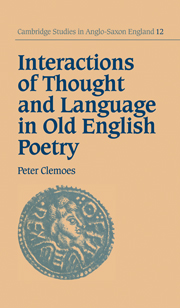Book contents
- Frontmatter
- Contents
- Illustrations
- Preface
- Abbreviations
- PART I The poetry of an aristocratic warrior society
- PART II The poetry of a universal religion
- 7 Vernacular poetic narrative in a Christian world
- 8 Poet, public petitioner and preacher
- 9 Symbolic language serving the company of Christ
- 10 Adaptation to a new material morality
- 11 From social hero to individual sub specie aeternitatis
- 12 Loyalty as a responsibility of the individual
- 13 This world as part of God's spiritual dominion
- Works cited
- Index I Quotations of two or more ‘lines’ of Old English poetry
- Index II A representative selection of the symbols and word pairs cited in discussion
- Index III General
8 - Poet, public petitioner and preacher
Published online by Cambridge University Press: 18 December 2009
- Frontmatter
- Contents
- Illustrations
- Preface
- Abbreviations
- PART I The poetry of an aristocratic warrior society
- PART II The poetry of a universal religion
- 7 Vernacular poetic narrative in a Christian world
- 8 Poet, public petitioner and preacher
- 9 Symbolic language serving the company of Christ
- 10 Adaptation to a new material morality
- 11 From social hero to individual sub specie aeternitatis
- 12 Loyalty as a responsibility of the individual
- 13 This world as part of God's spiritual dominion
- Works cited
- Index I Quotations of two or more ‘lines’ of Old English poetry
- Index II A representative selection of the symbols and word pairs cited in discussion
- Index III General
Summary
In this chapter I want to trace how vernacular poetry's narrative practice was affected by some comparable uses of non-poetic narrative in Christian devotion and teaching. As an operator of just one sort among others meeting Christianity's diverse needs, a vernacular poet rubbed shoulders with allied, though differing, practitioners as never before. A common attitude to their subject-matter was the bond between them all, but, since his tradition was the newcomer, a vernacular poet was especially open to suggestion from the rest. When treating New Testament and subsequent Christ-inspired events – or, indeed, Old Testament history regarded from a New Testament point of view – an Anglo-Saxon ‘I/we have heard/learned’ narrator was no longer a disinterested spokesman for tradition, relating, from a purely representative point of view, how a hero achieved what success he could in the face of predetermined death by exerting his will to do what society expected of him, as Beowulf did; he was now the voice of the poet himself, retelling the written record of the absolute triumph over death secured by Christ or the apostles or saints, or the absolute fulfilment of God's will by an Old Testament Moses, in ever-felt contrast to the uncertainty of his own standing with God and hence his eternal fate. Cynewulf, for instance, reviewed the fates of the apostles – ‘hu þa æðelingas ellen cyðdon, / torhte ond tireadige’ (‘how the men noble by inherited nature showed their spirit, /llustrious and glorious’, The Fates of the Apostles 3–4a) – for the very reason that he himself was weary of journeying and sick at heart: ‘Hwæt! Ic þysne sang siðgeomor fand / on seocum sefan’, he began (1–2a).
- Type
- Chapter
- Information
- Interactions of Thought and Language in Old English Poetry , pp. 273 - 309Publisher: Cambridge University PressPrint publication year: 1995

